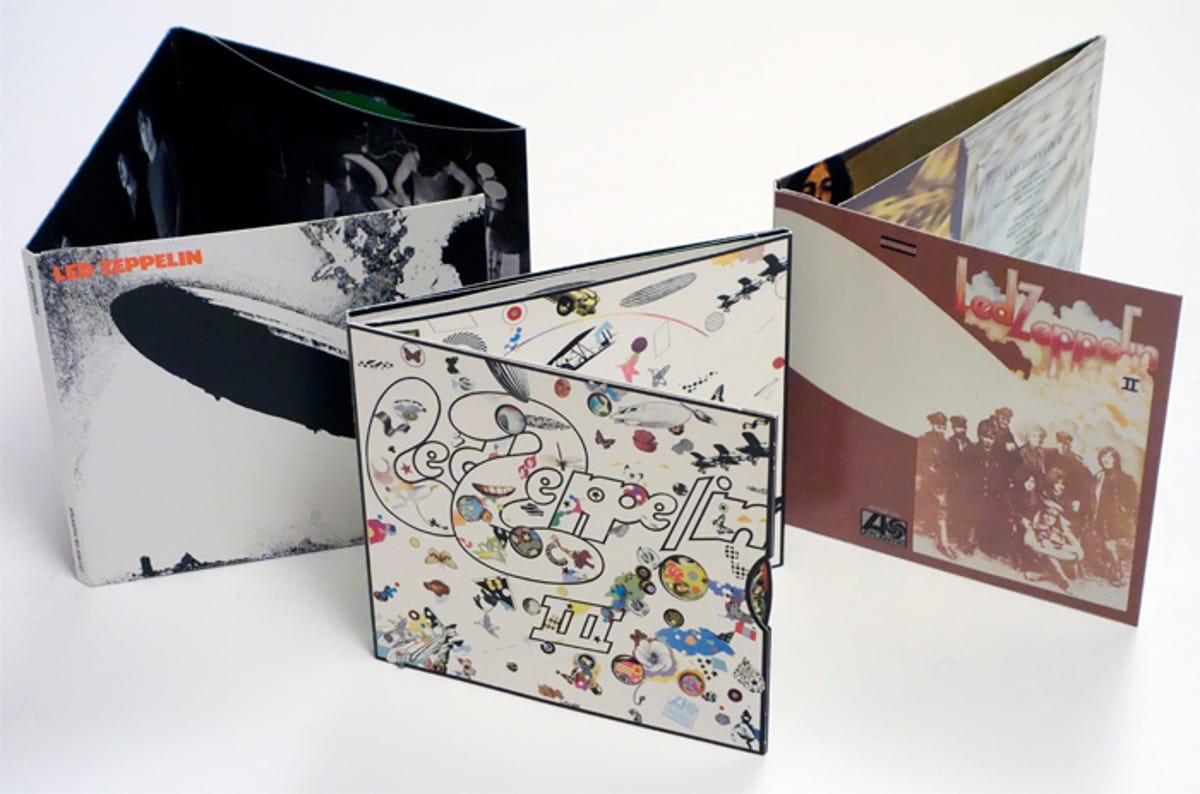
Steve Guttenberg/CNET
Led Zeppelin changed the sound of rock music in 1969, and that turned me into an audiophile.
Sure, it was the music that first sucked me in, but the “Led Zeppelin” and “Led Zeppelin II” albums were so much heavier than anything I’d heard before. The records of the Beatles, Rolling Stones, Jimi Hendrix, and Cream were great, but they sounded tinny and cramped next to “Led Zeppelin” and “Led Zeppelin II.” Guitarist Jimmy Page’s dense wall of sound, Robert Plant’s lung-popping vocals, John Paul Jones’ massive bass lines, and John Bonham’s drums’ thunder rattled my core. I started to think about the sound of music, because Led Zeppelin made it so compelling. Pure, all-analog LPs were the format of choice; digital recording was more than a decade away.
Everyone noticed the sound — it wasn’t just for a minuscule niche group of audiophiles. Led Zeppelin LPs moved me to first invest in a better phono cartridge, then the following year I bought a better turntable, and better speakers followed that. Every upgrade made the LPs sound bigger and more exciting.
Before Zeppelin, Page worked as a London session guitarist on other bands’ recordings, including the Rolling Stones, the Who, the Kinks, Donovan, Joe Cocker, and many, many unknown bands. Page said he learned how to make great-sounding records by playing on so many bad ones, he learned his lessons well.
The song does not remain the same…
‘Zeppelin’s long-form songs weren’t just showcases for extended jams, they were highly structured tunes. Led Zeppelin pioneered heavy metal sound, and though the bands that came later played faster and were louder, they didn’t connect emotionally the way ‘Zep did, at least not for me. Black Sabbath’s first album cam out in 1970, and it sounded derivative even then. According to Wikipedia, Led Zeppelin sold 111.5 million albums.
When the Zeppelin CDs first arrived in the 1990s, the mastering was only so-so; the sound quality of my old LPs handily trounced them, so I wasn’t sure what to expect from the 2014 CDs. Well, it’s easy to hear their big improvement: the sound has opened up, there’s soundstage depth, they’re warmer and more fleshed out. Returning to the old Zeppelin CDs, the sound is crushed and thin — the 2014 versions are the ones to get. All of the Deluxe, two-CD editions have bonus tracks, but my favorites are the live Olympia concert tracks from Paris in 1969 that are now on “Led Zeppelin.” The live tracks’ sound quality isn’t so great, and they’re in mono, but the performances are extraordinary. The live band’s raw power far exceeds the studio tracks, and Jimmy Page’s sonic experimentation with feedback and distortion is ahead of its time. It’s nothing like what Jimi Hendrix was doing; Page was exploring a very different terrain. The Deluxe editions are for hard-core fans, everyone else can go for the single-disc versions of the original albums.
Yes, there are 2014 digitally mastered “Led Zeppelin,” “Led Zeppelin II,” and “Led Zeppelin III” LPs, but I could not care less. I have my old, all-analog LPs from back in the day, and you can easily find decent old pressings for the same or less cash than the newly digitized LPs. If you have a turntable, go for the oldies first. Analog was the original, “native” format for these recordings, so if you want to hear what the music sounded like in the first place, pick up the old pressings. There’s gazillions of them out there, so pure analog LPs in good shape should be easy to find.
Right now we just have “Led Zeppelin,” “Led Zeppelin II,” and “Led Zeppelin III,” but the band will continue the reissue program for all nine of its studio albums in chronological order, each remastered by Jimmy Page.
If you have something to say about the audio or music business, or maybe a wish list of products that need to be invented, write a 400-to-600-word piece and you could be the Audiophiliac for a day. Send your copy to TheAudiophiliac (at) hotmail-dot-com, and paste the text into the email (don’t attach files), and please understand that your copy will be edited. The winning article will post in late June or early July. The deadline for entries is Friday, June 20, 2014.




